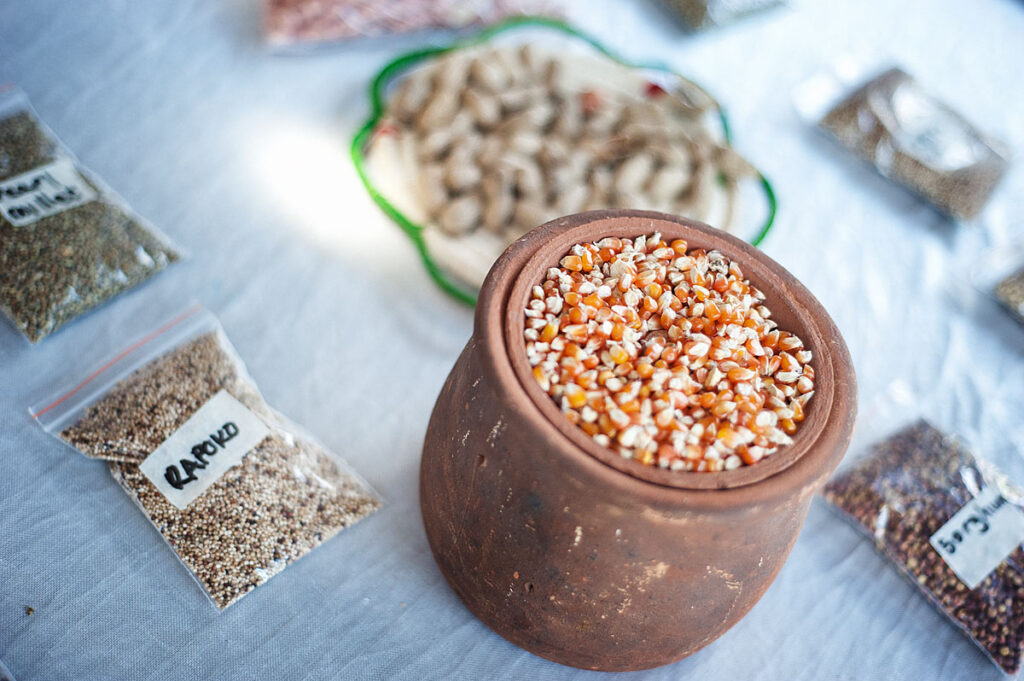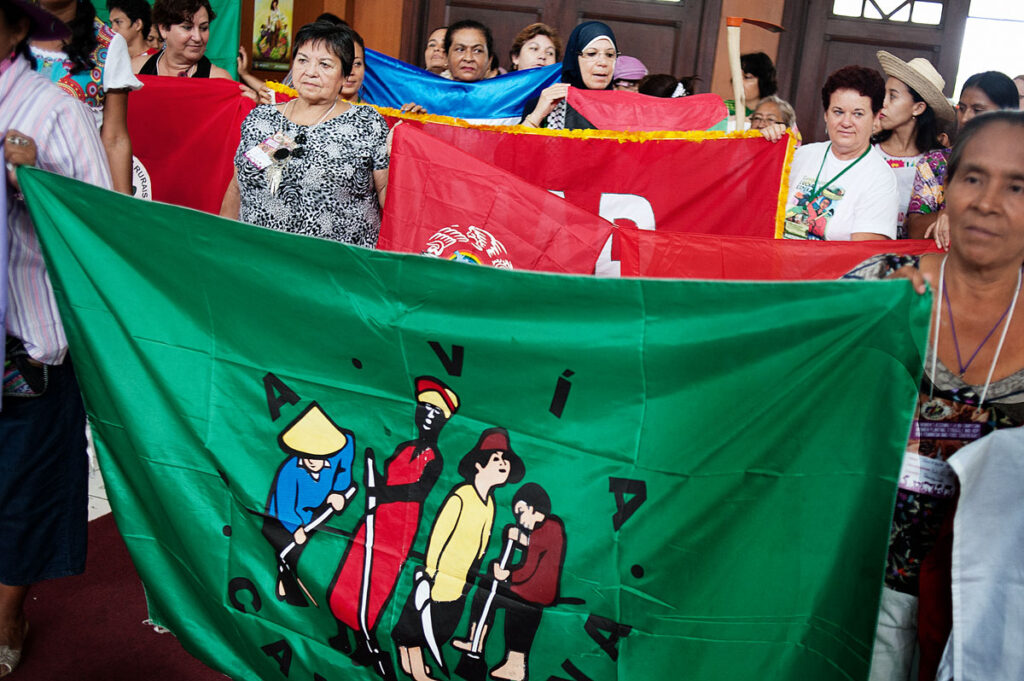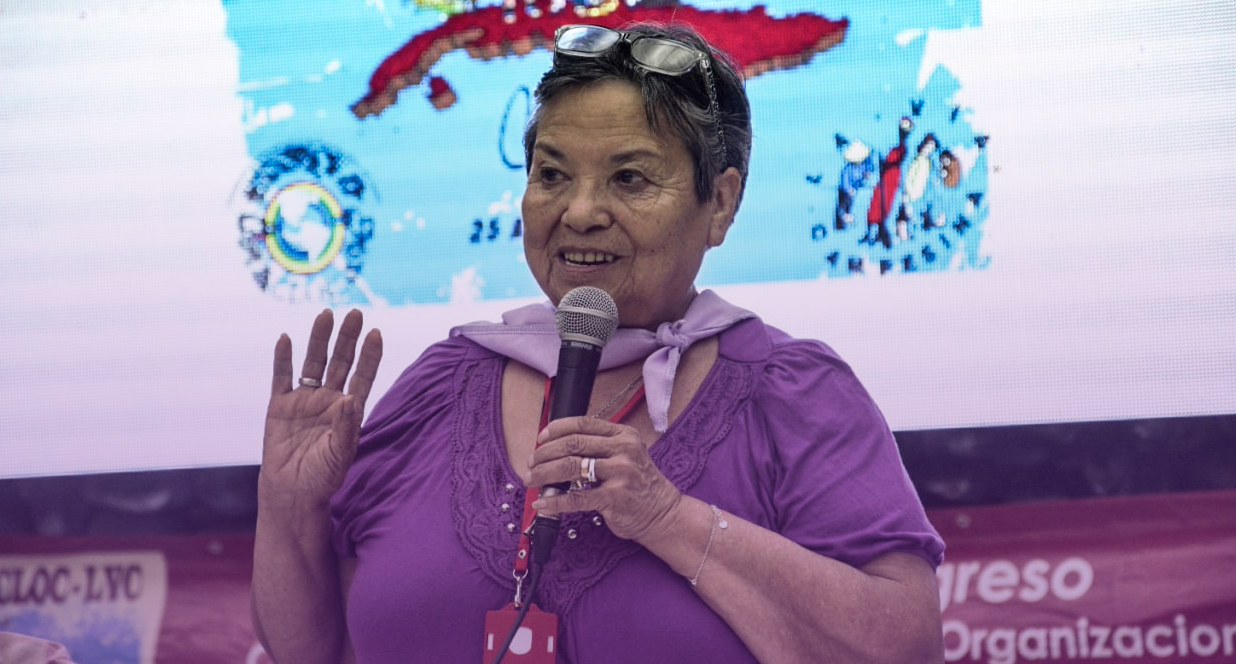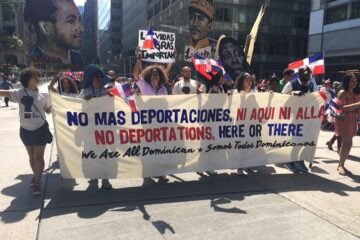To celebrate April 17th, International Day of Peasant Struggle, Capire publishes this interview with Pancha Rodríguez, a member of the Latin American Coordination of Countryside Organizations (Coordinadora Latinoamericana de Organizaciones del Campo—CLOC-La Via Campesina) and of the National Association of Rural and Indigenous Women of Chile (Asociación Nacional de Mujeres Rurales e Indígenas—ANAMURI). Pancha spoke about a long personal and collective journey of struggle for food sovereignty, feminism, and socialism.
First of all, please introduce yourself, looking back at your struggle as a militant and your life story.
I’m Luz Francisca Rodríguez, and everyone knows me as Pancha, which is short for Francisco and Francisca in our country. I come from a rural village that is now part of the city, because as the city expands, it takes over a big part of the countryside and the sectors that used to feed the villages. This forces me to be constantly migrating from the city. I’m someone who doesn’t have much formal education, but I have a great contribution regarding social, political, ideological, and cultural education within the movement.
I’m a flower farmer—this was my contradiction, I produced flowers, not food. When I was young, my work was dedicated to what now may be called a seasonal worker. I was a farmer, a gatherer. We started with the beans and worked our way to the vineyards.
Since I was very little, I had to take care of my home. I worked in different areas, including seasonal work in the countryside and working several different jobs in the winter. I worked for two years at a casino, the post office, and the telegraph office. Then I started to work in the union, at the youth department of the CUT [Unified Workers’ Central]. At age twelve, I joined the Communist Youth, and I’m “old school”: I’m part of the Communist Party, I do militant work in a cell, I pay my dues, I buy the newspaper, I study, I don’t hold big positions in the party, but I’m dedicated to the organization.
I was the woman in charge of the Communist Youth national office in its Central Committee, I worked a lot with the Women’s Front of the Popular Unity for the people’s government, I was one of the sisters working side by side with great women who built the first Women’s Department in the Allende administration, working for the Ministry of Women. Later, when I went underground, I worked with human rights supporting women who were building collectives with partners of political prisoners and victims of forced disappearance, with political prisoners, and family members in exile.
As of 1979, I was no longer underground and I joined the work of the Peasant Confederation of El Surco, now Ranquil, and became the female head. In 1988, when the “no” plebiscite was about to be held, my partner was elected secretary of the International Union of Agriculture, Forests, and Crops, which at the time was part of the World Federation of Trade Unions. I was in charge of the Women’s Matters office. From this process, I went on to build the campaign to commemorate the 500 years of Indigenous, peasant, Black, and grassroots resistance, and then the constitution of the CLOC and La Vía Campesina, always developing work with women in the organization, side by side with young sisters who come from feminist movements and organizations.
We eventually asked for a 30% quota for women participants at the second CLOC Congress. Our male comrades were baffled and laughed, but said it was not a problem, and, if we wanted, we could have a 50% quota. It was a big challenge for us, as we obviously could not reach that share, but we managed to have a 43% share of women participating. We worked to have parity across the CLOC’s organizational structure, and we achieved that as an agreement at the Congress. La Via Campesina also affirmed a commitment to gender parity on an international level.
At its third Congress, we said: “We need relative autonomy. We are not a small part of this, we are a process of rural women marching.” So we were no longer going to be a committee, and we proposed the creation of the Latin American and Caribbean Rural Women’s Coordination [Articulación de Mujeres del Campo de América Latina y el Caribe]. Every step we have taken in Latin America was followed by La Via Campesina, this is why we raise our stance within the peasant movement, which has an important historical milestone. We wanted the Declaration on the Rights of Peasants to be “of peasant women and men,” but we did not succeed. Nevertheless, since its inception, the declaration fully acknowledges our rights, advocates for the end of violence against rural women, and seems to be the only one that addresses sexual and reproductive rights, which I find very significant.
Your introduction is a very exciting account about personal and collective as well as political aspects, the history of Chile and our continent. Let’s talk about a topic related to building food sovereignty. We are living a reality where hunger is once again prevailing. It’s been 25 years since La Via Campesina proposed the principle of food sovereignty, a key to tackle hunger and the capitalist model. We would like to know the common elements between these periods and the challenges posed today.
Sometimes things happen at just the precise moment, and we don’t realize how huge that will be over time and for society as a whole. During the first World Food Summit, we proclaimed food sovereignty to counter governments and companies that had proclaimed food security as the overall ability to acquire—not produce—food. This meeting took place before a workshop of rural women.
After the campaign of the 500 years, we launched, with a women’s committee, the challenge of self-discovery. We emerged from the roots of the earth to discover ourselves in our resistance, our actions, and knowledge. The challenges were already there, and we found this approach from peasant men and women to tackle the governments and their intentions to yield to big corporations, which appropriates food and conceives it as just big business for capital.
Food sovereignty has restored our identity, because it was our right to produce. But as we talked about our rights, they expanded. It was not just about producing. It’s the right to agrarian reform, to land, to water, the right to remain a peasant man or woman. We found out that, throughout our lives, we had practiced food sovereignty. We owned food sovereignty and said: food sovereignty is not simply a discourse for us, it’s about an everyday practice, a continuing struggle, it’s about deciding to change the world.

To change the world, we had to continue this process of self-discovery, aiming to bring to light the history of the role women have always had in agriculture. At what point were we excluded, separated from this path, made invisible? We had to make women’s role visible, not only in production. Today, we take a step and look out as rural women to secure our space in the political debate, in decision making, and the perspectives waged for the future.
In Latin America, a rural women’s movement was being built in several organizations, and they were moving away from mixed-gender organizations, not to break away from the work of our male comrades, but to expand the horizons of women’s participation. One of the agreements reached within the CLOC during its first Congress was that it would not fear the emergence of women’s organizations. They understood that we contribute a lot to the movement, and that we create spaces of participation that are broader, more open and democratic, because we actually bring community life, land, and knowledge to the discussion. This meant accumulating content to food sovereignty.
Food sovereignty then becomes not just our proposal, but everyone’s proposal. At that first World Food Summit, we were virtually alone, but five years later, when we were preparing to assess the results of the action plan, many men and women joined us in the struggle for food sovereignty.
In addition to proclaiming our women’s platform, we propose another great topic: what happened to our seeds? This question has made us see that we, as peasants, were losing our strengths every time our seeds were eliminated. It was women who decided to call the CLOC and La Via Campesina to hold an international campaign to defend our seeds.

That was in the early 2000s, right?
Yes. We organized the Congress in Mexico and the II Women’s Continental Assembly, and the agreement was exactly about this campaign for the seeds. It was a tremendous contribution for the struggle for food sovereignty. You can’t have food sovereignty if you don’t have seeds. This was our decision. You can’t have agrarian reform without seeds, because the agrarian reform cannot be left to the arbitrary decisions of transnational corporations that want to manage the fate of the seeds.
At the II World Food Summit, in Rome, we were in charge of organizing the launch of the campaign. La Via Campesina brought seeds from all over the world, we held an impressive demonstration at the forum prior to the II Summit. It was an amazing, unimaginable show: a mosaic, a beautiful garden of seeds that I so zealously attended to. In the afternoon, I’d pick everything up and put it away in a huge bag, because we would later share the seeds, but they needed to be there for the official launch of the summit. We left for the demonstration and when we got back, the seeds had been stolen. This is when we started to call for the campaign “seeds are a heritage of humanity.”
But Monsanto delivered another blow. At Rio+10, in Johannesburg, South Africa, they said they agreed that seeds are a world heritage, because, this way, they were everyone’s, and so the companies also had the right to them. It was such a hard blow, it made us raise the question: what have we done? Have we risked our seeds even more? It was upsetting, we talked about it for a year… We had a meeting in Caaguazú and came to the conclusion: they are not the heritage of humanity. They are our heritage, the heritage of women, who discovered them. They are the heritage of Indigenous peoples and peasants, who, over the course of history, have spread, improved, and diversified them. This was the definition: seeds are a heritage of Indigenous peoples and peasants, and these are the peoples who historically allow them to be in service of humanity. So the campaign was launched again at the II World Social Forum, in Porto Alegre, Brazil.
I consider these political decisions that we have made historical milestones. Just like the demonstration we held in Curitiba. The Aracruz one, that was very important. But no one talks about the fact that in Curitiba, with the Southern Cone women’s school, we were able to stop them from lifting the moratorium on terminator seeds. It’s not simply about a proposal, it’s more than that: it’s an action of continuing struggle, resistance, and rebelliousness that we, as women, have carried out. It’s about our ability to look beyond everyday life, to look into the future.
I’d say that these are very significant moments to us: providing a platform, establishing gender equality, imposing two campaigns at the international level, which were conducted by us—the one for the seeds and one to tackle violence against women—and welcomed by everyone within La Via Campesina. Even though it is a strenuous process, it’s so powerful to define ourselves as feminists within a sector that has always been considered retrograde and conservative.
Our proposal for the struggle and the challenge to build a popular peasant feminism have developed from the discussions with the CLOC. It’s a challenge for peasants to build an alternative way to counter the neoliberal model. This is our path side by side with La Via Campesina. But in Latin America, our political challenge goes beyond building this alternative way. We want to build a new society. This is why we have decided that we shall not give up the struggle for a socialism that emerges from our roots, cultures, and identities.
We had to start reflecting about our search for our feminist identity, cause, and reason. This was the major discussion happening at the V Congress. There were powerful conversations and we realized that we really didn’t know much about women’s breakthroughs in the feminist struggle since the past century, about their ability to build a huge women’s movement around the world and conceive an assessment system, a strategy, and gender politics.
But we also analyzed how the system is taking over the instruments that we are building in our struggle. Suddenly, the official policies turned us from women in development with clear, defined resources into simply a percentage. We promoted this conversation to lay the foundations for rural women’s political activity and to convey a strong sense that having a women’s movement that is visible and expressed in the struggle is necessary. Today we are a rural women’s movement at a continental level and beyond. We have a number of women’s organizations that pursue their own spaces to expand women’s horizons, not to break us apart from the joint political struggle—after all, this society cannot be transformed by women alone.

It was really good to take stock of the moment we proposed the self-discovery challenge. I think we discovered ourselves. From this culture and identity as women, we moved forward at the CLOC and La Via Campesina and strengthened our organization. Women today make up 50%, and perhaps we are much more dedicated and cooperate much more. “Stay home, but not silent” is a challenge proposed by La Via Campesina, and it does not emerge by chance, but in face of a grave pandemic situation. It gives us the opportunity to face complex moments such as this, which require us to be spearheading the organization, encouraging women’s strength, taking a strong step toward facing violence and multiplying our ability to create.
The demand for food that people need to resist this crisis and continue to fight has increased. The people are getting back to creating collective kitchens and restaurants, making stews… Eating what they used to eat in the past, because some of us were definitely stuck to the market.
You make an important point about the contribution of women with La Via Campesina for grassroots feminism, in the sense of not separating the building of women’s spaces from the more radical struggles that you wage. When you launch a perspective stating that there is no socialism without feminism, you not only strengthen the entire peasant movement, but also everything that we, as allied social movements, build.
Ten years ago, we said “there is no socialism without feminism.” Now that’s no longer the slogan, as we propose a bigger political cause: “with feminism, we will build socialism.” The meaning of our slogan has changed to open room for this movement-building process that has been moving rural women. We looked back in history, from the emergence of agriculture to current times, to find out how the process was for rural women. Why is community life vanishing? What is the role we play? How sovereign are our communities and ourselves? We want to paint a bigger picture around sovereignty.
Miriam Nobre took part in the first women’s school in Latin America that we held in Chile, to talk to us about the feminist conceptions of the World March of Women. She told us that our feminism is political and class-based. This definition, by the March, has driven us to define the feminism that we had to build. We were women that were mostly in mixed-gender organizing. We felt that our feminism was class-based because it was part of the peasant struggle and, therefore, the people. The political definition provided by the March shed light for us to define our own feminism. This is definitely something that brings us together.
There is a mission in life, an outlined path that has been accomplished: we have a well-established movement in Latin America. A conscientious, brave movement, looking toward the future. A movement that will help change the world and secure food sovereignty as a sacred right to life.




